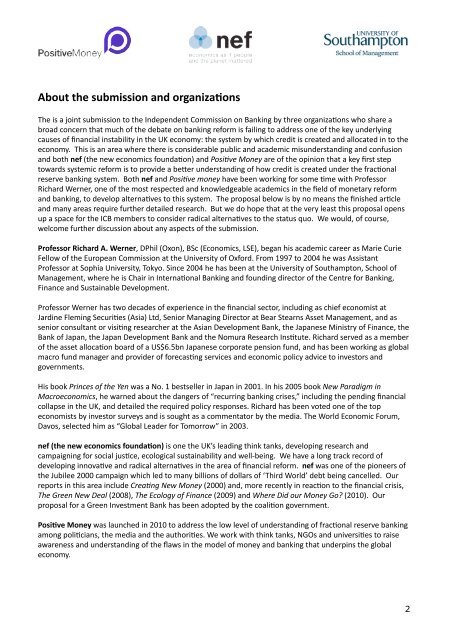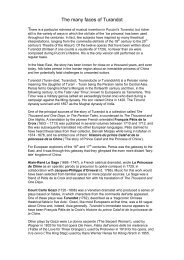NEF-Southampton-Positive-Money-ICB-Submission
NEF-Southampton-Positive-Money-ICB-Submission
NEF-Southampton-Positive-Money-ICB-Submission
Create successful ePaper yourself
Turn your PDF publications into a flip-book with our unique Google optimized e-Paper software.
About the submission and organizaPons<br />
The is a joint submission to the Independent Commission on Banking by three organizaGons who share a<br />
broad concern that much of the debate on banking reform is failing to address one of the key underlying<br />
causes of financial instability in the UK economy: the system by which credit is created and allocated in to the<br />
economy. This is an area where there is considerable public and academic misunderstanding and confusion<br />
and both nef (the new economics foundaGon) and Posi%ve <strong>Money</strong> are of the opinion that a key first step<br />
towards systemic reform is to provide a beOer understanding of how credit is created under the fracGonal<br />
reserve banking system. Both nef and Posi%ve money have been working for some Gme with Professor<br />
Richard Werner, one of the most respected and knowledgeable academics in the field of monetary reform<br />
and banking, to develop alternaGves to this system. The proposal below is by no means the finished arGcle<br />
and many areas require further detailed research. But we do hope that at the very least this proposal opens<br />
up a space for the <strong>ICB</strong> members to consider radical alternaGves to the status quo. We would, of course,<br />
welcome further discussion about any aspects of the submission.<br />
Professor Richard A. Werner, DPhil (Oxon), BSc (Economics, LSE), began his academic career as Marie Curie<br />
Fellow of the European Commission at the University of Oxford. From 1997 to 2004 he was Assistant<br />
Professor at Sophia University, Tokyo. Since 2004 he has been at the University of <strong>Southampton</strong>, School of<br />
Management, where he is Chair in InternaGonal Banking and founding director of the Centre for Banking,<br />
Finance and Sustainable Development.<br />
Professor Werner has two decades of experience in the financial sector, including as chief economist at<br />
Jardine Fleming SecuriGes (Asia) Ltd, Senior Managing Director at Bear Stearns Asset Management, and as<br />
senior consultant or visiGng researcher at the Asian Development Bank, the Japanese Ministry of Finance, the<br />
Bank of Japan, the Japan Development Bank and the Nomura Research InsGtute. Richard served as a member<br />
of the asset allocaGon board of a US$6.5bn Japanese corporate pension fund, and has been working as global<br />
macro fund manager and provider of forecasGng services and economic policy advice to investors and<br />
governments.<br />
His book Princes of the Yen was a No. 1 bestseller in Japan in 2001. In his 2005 book New Paradigm in<br />
Macroeconomics, he warned about the dangers of “recurring banking crises,” including the pending financial<br />
collapse in the UK, and detailed the required policy responses. Richard has been voted one of the top<br />
economists by investor surveys and is sought as a commentator by the media. The World Economic Forum,<br />
Davos, selected him as “Global Leader for Tomorrow” in 2003.<br />
nef (the new economics foundaPon) is one the UK’s leading think tanks, developing research and<br />
campaigning for social jusGce, ecological sustainability and well-‐being. We have a long track record of<br />
developing innovaGve and radical alternaGves in the area of financial reform. nef was one of the pioneers of<br />
the Jubilee 2000 campaign which led to many billions of dollars of ‘Third World’ debt being cancelled. Our<br />
reports in this area include Crea%ng New <strong>Money</strong> (2000) and, more recently in reacGon to the financial crisis,<br />
The Green New Deal (2008), The Ecology of Finance (2009) and Where Did our <strong>Money</strong> Go? (2010). Our<br />
proposal for a Green Investment Bank has been adopted by the coaliGon government.<br />
PosiPve <strong>Money</strong> was launched in 2010 to address the low level of understanding of fracGonal reserve banking<br />
among poliGcians, the media and the authoriGes. We work with think tanks, NGOs and universiGes to raise<br />
awareness and understanding of the flaws in the model of money and banking that underpins the global<br />
economy.<br />
2



